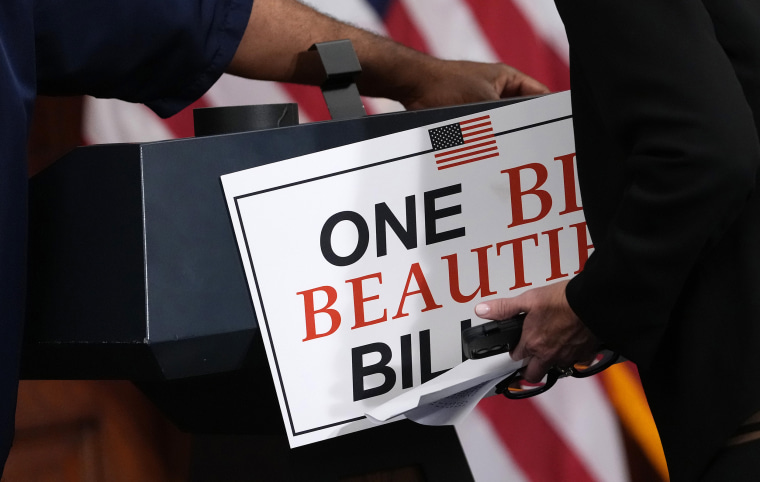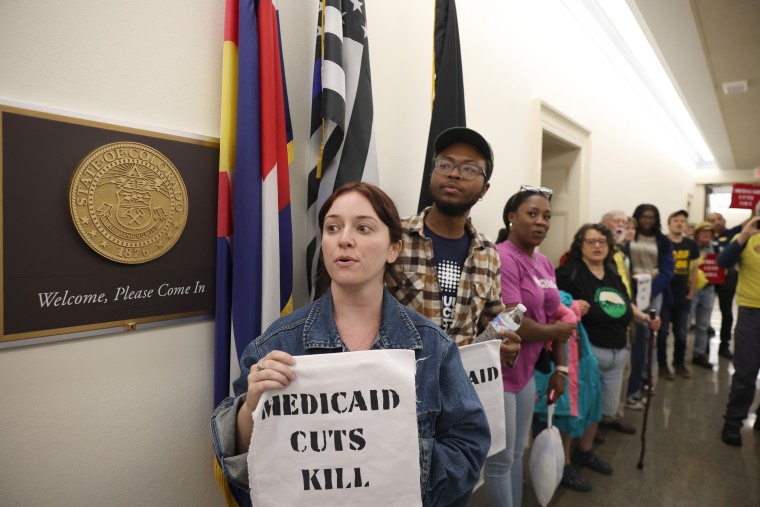Who wins and loses in Republicans’ ‘huge, stunning invoice’
Laws making its approach by way of the Senate stands to have wide-ranging results throughout the financial system — bolstering tax advantages for companies and higher-income households whereas threatening medical health insurance for thousands and thousands of People and placing 1000’s of unpolluted power and well being care jobs in danger.
The invoice, which is greater than 900 pages lengthy and Republicans have dubbed the “huge, stunning invoice,” handed a key procedural vote over the weekend within the Senate largely alongside get together strains, with all however two Republicans voting to advance it.
Observe dwell protection right here
The Senate is now debating the measure earlier than taking a last vote. If the invoice passes the Senate, it should then return to the Home for one more vote and in the end should be signed by President Donald Trump earlier than turning into legislation. Whereas adjustments might nonetheless be made and its passage isn’t sure, listed here are among the key winners and losers below the newest model of the invoice.
Winner: Firms
The laws makes everlasting trillions of {dollars} in company tax cuts enacted in 2017 throughout Trump’s first time period and expands different tax breaks for companies. That features completely reducing the company tax fee to 21% from the 35% degree earlier than the 2017 tax cuts. The invoice additionally extends or will increase different tax breaks for enterprise investments, like these on new equipment, gear and analysis and growth, which enterprise teams have mentioned would encourage enterprise investments within the U.S. The invoice additionally extends by way of 2033 tax incentives enacted in 2017 for companies that spend money on deprived areas, referred to as Alternative Zones.
Loser: Youthful generations
The tax cuts will add round $3 trillion over the following decade to the nationwide debt, in line with an evaluation by the Congressional Price range Workplace. Which means the U.S. should borrow extra money to cowl its bills, requiring it to pay an estimated $600 billion to $700 billion in further curiosity funds — cash that the federal authorities may very well be spending on different priorities or longer-term investments, in line with an evaluation by the Middle for a Accountable Federal Price range.

The sum of money People pay towards curiosity on the nation’s debt is anticipated to extend sharply within the coming years, totaling $78 trillion over the following 30 years and accounting for 34% of federal revenues, in line with the Congressional Price range Workplace.
Larger debt might additionally drive up rates of interest for each private and non-private debtors as a result of larger debt ranges can increase issues amongst buyers concerning the U.S. authorities’s capacity to in the end repay its debt.
Winner: Larger-income households
The invoice would tremendously increase the quantity of state and native taxes households are in a position to deduct from their federal taxes from the present cap of $10,000 to as much as $40,000.
The most important beneficiaries from the change could be households making between $200,000 and $500,000 a yr and those that personal property, as a result of they’re extra prone to pay larger property and revenue taxes, in line with an evaluation by the Committee for a Accountable Federal Price range. It could additionally disproportionately profit households in higher-tax states, like New York, New Jersey and California.
Rich households and enterprise house owners may also profit from a everlasting discount within the property tax. Underneath the laws, heirs of estates valued at lower than $15 million won’t should pay a tax on their inheritance. That cap is ready to drop to $7 million in 2026.
Loser: Decrease-income households
Provisions within the newest model of the invoice would trigger almost 12 million low-income people to lose their medical health insurance over the following decade by chopping round $1 trillion from Medicaid, the medical health insurance program for poor and disabled individuals, in line with the CBO. The Senate invoice contains steeper cuts to Medicaid than an earlier model handed by the Home.

The cuts would take a specific toll on People in rural areas who usually tend to obtain their medical health insurance by way of Medicaid than these in city or suburban areas. Researchers at Georgetown College discovered that 40% of kids in small and rural cities obtain their medical health insurance from Medicaid. The invoice might additionally cut back the quantity of people that obtain their insurance coverage by way of the Inexpensive Care Act.
The model of the Senate invoice launched over the weekend additionally contains cuts to the Supplemental Vitamin Help Program, additionally know as meals stamps, by requiring adults with out a incapacity between the ages of 18 to 64 to work no less than 80 hours a month except they’re caring for a kid below the age of 10. The added necessities might result in $300 billion in cuts to meals stamp spending, in line with the Congressional Price range Workplace.
Winner: Employees with revenue from ideas and extra time
The laws would carry by way of on a marketing campaign promise by President Trump to exempt revenue from ideas and extra time from federal revenue taxes. Tipped staff make up about 2.5% of the workforce and about 12% of hourly staff clock some extra time annually, in line with an evaluation by the Yale Price range Lab.
Each tax exemptions are structured as deductions that staff would declare after they filed their taxes the next yr. The tax exemption would apply solely to federal revenue tax, so staff would nonetheless should pay Social Safety and Medicare taxes on their revenue, together with any state or native taxes.
Amongst tipped staff, as many as 40% already don’t make sufficient cash to should pay federal revenue tax on any of their earnings so the profit could be comparatively restricted, the Yale Price range Lab discovered.
Loser: Well being care staff
Much less funding for Medicaid and fewer individuals with medical health insurance would imply a drop-off in physician’s workplace visits, prescription refills and medical procedures — and, consequently, fewer staff wanted to assist these sorts of companies. That might result in the lack of almost 500,000 well being care jobs over the following decade, in line with an evaluation by George Washington College and the Commonwealth Fund.
The Senate laws seeks to mitigate a few of that ache for rural well being care suppliers, who take care of a disproportionately excessive variety of Medicaid sufferers, with a $25 billion fund for rural hospitals.
Winner: Fossil gasoline firms

Each the Home and the Senate invoice embrace wins for the fossil gasoline business, stripping away quite a few provisions put in place throughout President Joe Biden’s administration to shift power consumption away from fossil fuels. Each payments would delay a price on extra methane air pollution by oil and fuel firms, roll again Biden-era guidelines to curb car emissions and embrace provisions supposed to hurry the event of latest fossil gasoline tasks.
The Senate invoice additionally features a new tax workaround for oil drillers that may allow lots of them to keep away from having to pay a company different minimal tax of 15%.
Loser: Clear power firms and staff
Clear power firms say the invoice might cripple their companies by stripping away tax subsidies and funding made accessible throughout the Biden administration. The Senate invoice would go additional than the sooner model handed within the Home by imposing new tax penalties on wind and photo voltaic farm tasks began after 2027, except they meet sure necessities. That might jeopardize billions of {dollars} in investments in clear power tasks — together with the 1000’s of jobs that may come together with these tasks, together with in Republican-led states like Georgia and South Carolina.
Different provisions would scale back advantages for customers shopping for electrical autos, photo voltaic panels and home equipment to make their houses extra power environment friendly.

